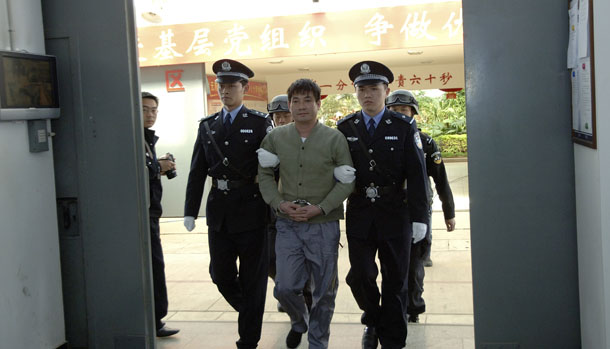BEIJING — China executed four foreigners Friday for the killing of 13 Chinese sailors in an attack on the Mekong River, following a live nationwide broadcast showing them being led to their deaths that harkened back to the mass public execution rallies of past years.
State broadcaster CCTV showed the four being led from their cells at a jail in southwestern Yunnan province’s capital of Kunming at about 2 pm prior to their execution by lethal injection. In shackles and handcuffs, they were trussed with a rope binding their arms behind their backs before being placed into court vans and driven to execution chambers.
Their deaths were announced two hours later by the Yunnan provincial police department.
Accused ringleader Naw Kham and accomplices Hsang Kham, Yi Lai, and Zha Xiha were found guilty of the murder of 13 Chinese sailors in an October 2011, attack on the Mekong River. The four are of Burmese, Thai, Laotian, and unknown nationality. Two others were given suspended death sentences for their parts in the killings.
Friday’s live broadcast was unusual because China has mostly abandoned the once common practice of parading condemned criminals before crowds in stadiums and through city streets on the way to execution grounds on the edge of cities.
The decision to broadcast was a response to widespread outrage among the Chinese public over the killings, as well as an attempt to emphasize both the heinousness of the crime and the efficiency of China’s police and courts in doling out justice to the four, said professor Yu Guoming of the School of Mass Media at Beijing’s Renmin University.
“The brutality of Naw Kham in the killing really got ordinary Chinese people riled up. It’s no wonder that it has attracted such huge attention from the public,” Yu said.
The gang was accused of ambushing two flat-bottomed Chinese cargo ships on the upper reaches of the Mekong on Oct. 5, 2011, in Burmese waters infested with gangs that make their livings from protection rackets and the production and smuggling of heroin, methamphetamine and other drugs. The Mekong flows south from Yunnan through the infamous Golden Triangle region, where the borders of Burma, Laos and Thailand meet, and provides a vital trade and transportation route between southwestern China and Southeast Asia.
The ships were recovered downriver later the same day by Thai police following a gun battle with gang members, and the bodies of the 13 dead, some of whom were bound by the hands before being stabbed and shot, were fished from the river over the following days. Methamphetamines were found on the boats, leading to speculation they had been hijacked as part of a drug smuggling plot.
However, gang members later testified the killings were in retaliation for the ships refusing to pay protection money and allowing themselves to be used by Thai and Laotian soldiers in attacks on warlord bases. They said the drugs were placed on board to make it look like there had been a struggle between smugglers.
China’s Public Security Ministry made the case a top priority and Naw was arrested in Laos on April 25 last year and turned over to China the following month along with his accomplices. Because the killings took place on board Chinese flagged vessels, Beijing, whose massive economy and powerful military gives it considerable sway over its smaller southern neighbors, ruled the trials should take place in China.
Months after the killings, China established a multinational river patrol mechanism headquartered in Yunnan, which Beijing claims has been effective in clamping down on such bloody incidents.
“The case set a precedent that China would vigorously pursue criminals who commit crimes against its nationals. That’s led to an expansion of Chinese police powers into the neighboring region and a big boost in Chinese influence,” said Jin Canrong, associate dean of Renmin University’s School of International Studies.
Associated Press researcher Yu Bing contributed to this report.
















